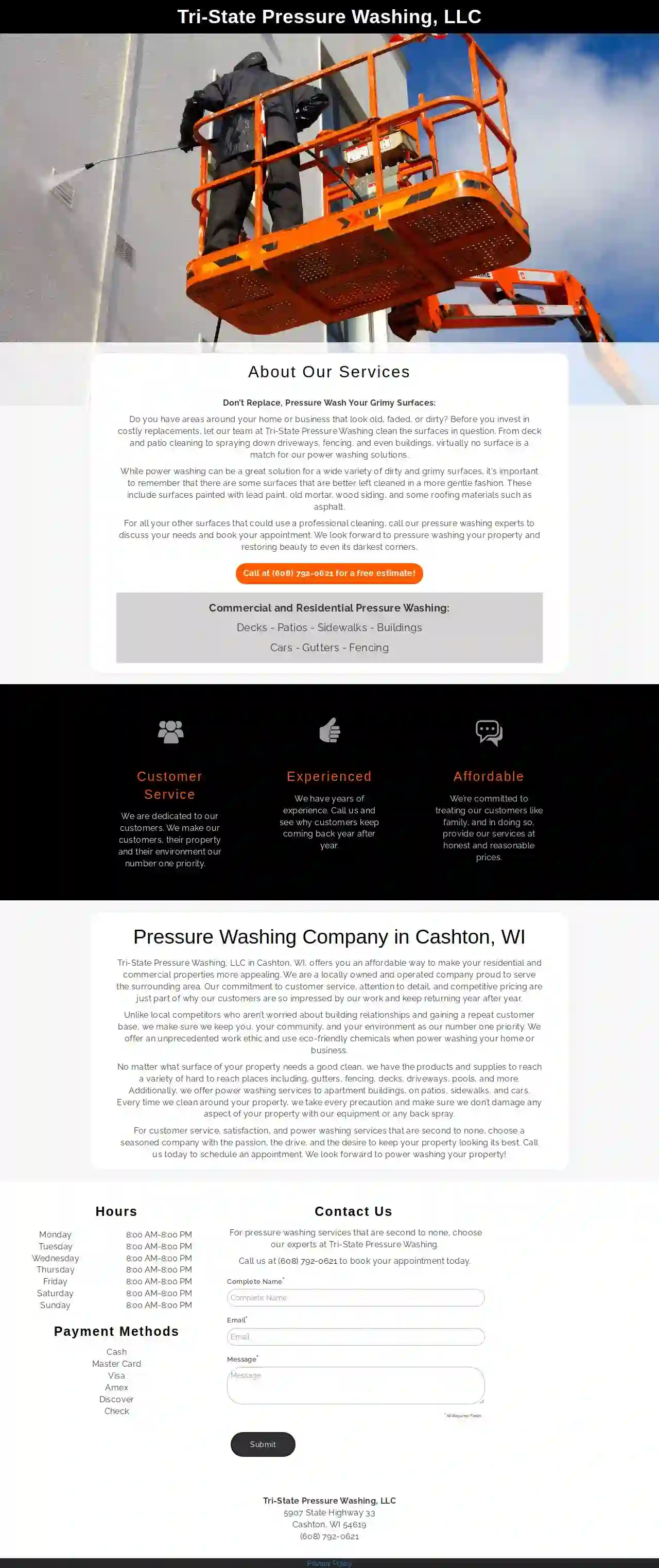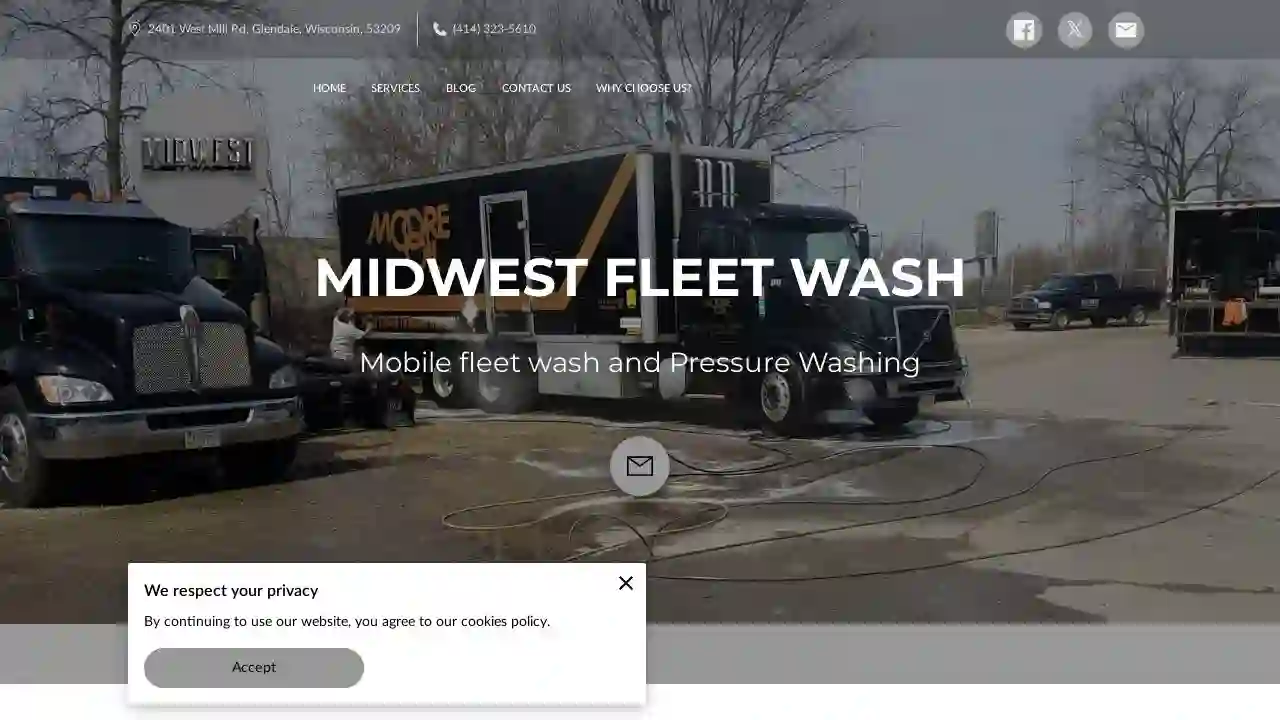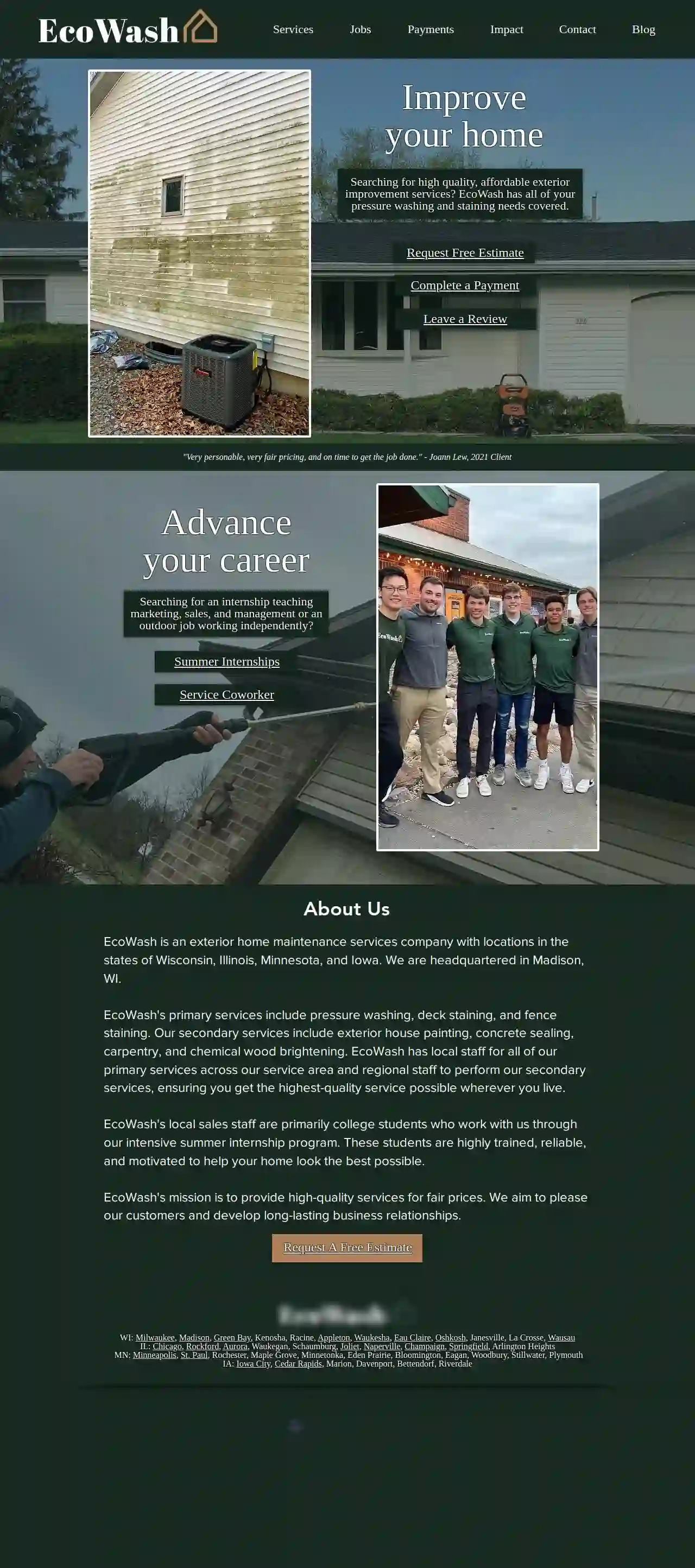Pressure Washing Mauston
Best Power Washing in Mauston
Receive up to 3 Commercial Pressure Washing quotes for your project today! Compare profiles, reviews, accreditations, portfolio, etc... and choose the best service.

A & B Pressure Washing
52 reviews11731 Deer Ridge Rd, Wisconsin Rapids, 54494, USA & B House & Power Washing is a locally owned and operated pressure washing service provider serving the greater Wisconsin Rapids and Central Wisconsin area. We offer complete house and power washing services for residential, commercial, and municipal facilities. We pride ourselves on treating every home like our own, ensuring quality service and exceeding expectations. Our team is dedicated to providing free estimates and explaining our cleaning process thoroughly.
- Services
- Why Us?
- Gallery
Get Quote
Sparkle Wash Eau Claire
4.849 reviewsMilwaukee, USSparkle Wash is a professional pressure washing company that provides reliable and efficient cleaning services for residential, commercial, and industrial properties. With years of experience and a team of skilled professionals, we use the latest equipment and cleaning agents to get the job done right. Our services include building exterior washing, condominium and apartment complex cleaning, commercial concrete cleaning, graffiti removal, ice dam removal, industrial pressure washing, post construction clean up, and more. We also offer specialized services for fleet, agricultural, and marine properties. Contact us today to schedule your appointment and get a free quote!
- Services
- Why Us?
- Gallery
Get Quote
Pressure Wash 360 - Pressure Washing Co.
52 reviewsEAU CLAIRE, Eau Claire, 54701, USPressure Wash 360 is the #1 source for professional pressure washing, power washing, deck cleaning, building pressure washing, TPO and PVC rubber roof cleaning, and lake home washing in the Chippewa Valley! We have over 20 years of pressure washing restoration solutions. Pressure Wash 360 is not just another pressure washing and pressure cleaning company. We pride ourselves on being the industry leader in fire damage restoration, TPO and PVC rubber roof cleaning, building washing, house washing, lake and log home siding cleaning, deck cleaning, gutter cleaning, ice damming, concrete cleaning, and historical stone restoration. We will provide to our clients first-class pressure washing solutions with an emphasis on servicing it right the first time. We provide the very best customer service experience of anyone in the service industry. Need Pressure Washing Services?
- Services
- Why Us?
- Gallery
Get Quote
Tri-State Pressure Washing
5907 State Highway 33, Cashton, 54619, USTri-State Pressure Washing, LLC is a locally owned and operated company serving the Cashton, WI area. We specialize in providing affordable and eco-friendly pressure washing solutions for both residential and commercial properties. Our team is dedicated to customer satisfaction, offering years of experience and a commitment to detail. We prioritize your property, your community, and the environment, ensuring a thorough and safe cleaning process. Whether it's decks, patios, driveways, buildings, or even cars, we have the expertise and equipment to handle a variety of surfaces. We take pride in building lasting relationships with our customers, providing honest and reasonable prices for exceptional service.
- Services
- Why Us?
- Gallery
Get Quote
Under Pressure Power Washing
5107 reviewsEvansville, Wisconsin, USUnder Pressure Power Washing, LLC is a local, trusted, and family-owned business that provides exterior cleaning and pressure washing services for residential and commercial clients. We utilize a special soft washing technique that is the safest and best way to clean the exterior of your home or business. Our experienced team is dedicated to providing the highest level of service to make sure you are completely satisfied. We offer a satisfaction guarantee on all completed services and provide free estimates, fast turnaround, and on-time service. Contact us today to get started with your exterior cleaning projects.
- Services
- Why Us?
- Testimonials
- Gallery
Get Quote
Pressure Pro Exteriors
578 reviewsWest Bend, WI, 4916 Cal Dr., 53095, USCelebrating our 7th year of providing the best exterior cleaning services in West Bend, WI. We offer Window Cleaning, Pressure Washing, gutter Cleaning, Ice dam removal & More! We understand the stress of hiring a cleaning company. Let us show you how easy it is! We are here to answer questions and educate every step of the way. Our customers are our family and 5 star service is what we provide to every one of our customers from start to finish. If you are not happy neither are we. We can’t wait to work with you on your next project!
- Services
- Why Us?
- Our Team
- Testimonials
- Gallery
Get Quote
WISCON POWER WASHING
512 reviewsRacine, USAt Wiscon Power Washing, we offer only the highest quality exterior cleaning solutions possible. Any local property owner can rely on us for house washing, roof cleaning, commercial power washing, and pressure washing in Racine, WI, and the surrounding communities. Instead of trying to handle your project yourself, work with our dedicated, skilled, and experienced professionals for unbeatable work that's proven to be better than DIY options or working with the other guys. Give us a call today to get started on your project. We're also happy to provide a fast quote!
- Services
- Why Us?
- Our Team
- Testimonials
- Gallery
Get Quote
Sparkle Wash Central State Washing
53 reviewsMilwaukee, USSparkle Wash Central State Pressure Washing provides a variety of power washing and restoration services in the commercial, residential and fleet markets. Our technicians are trained to pressure wash houses to multi-floor office buildings and everything in-between. No project is too big — or too small. As pressure washing experts, we pride ourselves on training, experience and reliability. We recognize that every project is different, and we can quickly assess what’s needed from different water pressures to effective cleaning agents. At Sparkle Wash, we cater our services to your needs and recommend a customized plan that’s right for you and your budget.
- Services
- Why Us?
- Gallery
Get Quote
Mobi Clean pressure washing
55 reviews2401 West Mill Rd, Glendale, 53209, USMidwest Fleet Wash is a premier fleet washing and equipment cleaning provider in the greater Milwaukee area. As a division of the well-established Midwest Maintenance LLC, we offer a wide range of cleaning services to keep your fleet looking its best. Our fleet washing services include truck, trailer, and other equipment cleaning. We are committed to giving our customers the highest level of service, with no fluff. We understand that taking the time to use the proper tools and techniques while pressure washing any piece of equipment is crucial.
- Services
- Why Us?
- Accreditations
- Gallery
Get Quote
EcoWash
4.9115 reviews123 Main St, Suite 100, Madison, 53703, USEcoWash is an exterior home maintenance services company with locations in the states of Wisconsin, Illinois, Minnesota, and Iowa. We are headquartered in Madison, WI. Our primary services include pressure washing, deck staining, and fence staining. Our secondary services include exterior house painting, concrete sealing, carpentry, and chemical wood brightening. EcoWash has local staff for all of our primary services across our service area and regional staff to perform our secondary services, ensuring you get the highest-quality service possible wherever you live. Our local sales staff are primarily college students who work with us through our intensive summer internship program. These students are highly trained, reliable, and motivated to help your home look the best possible. Our mission is to provide high-quality services for fair prices. We aim to please our customers and develop long-lasting business relationships.
- Services
- Why Us?
- Accreditations
- Our Team
- Testimonials
- Gallery
Get Quote
Over 60,241+ Cleaning Businesses registered
Our cleaning companies operate in Mauston & surrounding areas!
CleaningMatch has curated and vetted Top Cleaning Companies arround Mauston. Find a reliable pro today.
Frequently Asked Questions About Pressure Washing
- Wear Protective Gear: Wear safety glasses, closed-toe shoes, and long pants to protect yourself from flying debris and water spray.
- Never Point the Nozzle at Yourself or Others: High-pressure water can cause serious injuries. Always point the nozzle away from yourself, others, and pets.
- Use Caution on Ladders: If working on a ladder, ensure it is stable and secure. Avoid overreaching or leaning too far to one side.
- Be Mindful of Electrical Hazards: Keep water away from electrical outlets, wiring, and appliances.
- Follow Manufacturer's Instructions: Always read and follow the pressure washer manufacturer's instructions for safe operation and maintenance.
- Driveways: Removes oil stains, tire marks, dirt, and grime, restoring the appearance of concrete, asphalt, or paver driveways.
- Decks and Patios: Cleans wood, composite, or concrete decks and patios, removing dirt, mildew, and algae, and preparing them for staining or sealing.
- Fences: Revitalizes wood, vinyl, or composite fences, removing dirt, grime, and weathering, and enhancing their appearance.
- Siding: Cleans vinyl, aluminum, brick, or wood siding, removing dirt, mold, mildew, and other contaminants, and restoring its original color.
- Roofs: Removes moss, algae, and other debris from roofs, extending their lifespan and improving their appearance. Soft washing is typically recommended for roof cleaning to prevent damage.
- Walkways and Sidewalks: Cleans concrete or brick walkways and sidewalks, removing dirt, grime, and stains, and improving safety by reducing slipperiness.
- Brick and Stone: Cleans brick and stone surfaces, removing dirt, mildew, and efflorescence, and restoring their natural beauty.
- Annually: Pressure washing your house at least once a year helps remove accumulated dirt, grime, and other contaminants, keeping it looking its best.
- Every 2-3 Years: If you live in an area with high humidity, heavy tree cover, or frequent exposure to pollutants, more frequent pressure washing may be necessary.
- When Visible Dirt and Grime Appear: Address visible dirt, stains, or mold growth promptly to prevent them from becoming more challenging to remove.
- Enhanced Curb Appeal: Pressure washing removes dirt, grime, and stains, instantly revitalizing the appearance of your property and boosting curb appeal.
- Improved Health and Safety: Pressure washing removes mold, mildew, algae, and other contaminants that can pose health risks and create slippery surfaces.
- Increased Property Value: A well-maintained exterior, achieved through regular pressure washing, can increase the value of your property.
- Preventative Maintenance: Pressure washing removes dirt and grime that can deteriorate surfaces over time, extending the lifespan of your driveway, deck, fence, and other exterior features.
- Preparation for Painting or Staining: Pressure washing is an essential step before painting or staining, as it provides a clean and receptive surface for the new coating to adhere to.
What are some safety precautions to take when pressure washing?
Prioritizing safety when pressure washing protects you and others from potential injuries or accidents.
What surfaces can be pressure washed?
It's important to note that different surfaces require different pressure levels and cleaning solutions. Always consult with a professional pressure washing company to determine the appropriate cleaning method for your specific needs.
How often should I pressure wash my house?
Regular pressure washing can maintain your home's exterior, extend the lifespan of your siding, and enhance its curb appeal.
What are the benefits of pressure washing?
Whether you're looking to improve your property's appearance, protect its value, or enhance health and safety, pressure washing is a valuable investment.
What are some safety precautions to take when pressure washing?
- Wear Protective Gear: Wear safety glasses, closed-toe shoes, and long pants to protect yourself from flying debris and water spray.
- Never Point the Nozzle at Yourself or Others: High-pressure water can cause serious injuries. Always point the nozzle away from yourself, others, and pets.
- Use Caution on Ladders: If working on a ladder, ensure it is stable and secure. Avoid overreaching or leaning too far to one side.
- Be Mindful of Electrical Hazards: Keep water away from electrical outlets, wiring, and appliances.
- Follow Manufacturer's Instructions: Always read and follow the pressure washer manufacturer's instructions for safe operation and maintenance.
Prioritizing safety when pressure washing protects you and others from potential injuries or accidents.
What surfaces can be pressure washed?
- Driveways: Removes oil stains, tire marks, dirt, and grime, restoring the appearance of concrete, asphalt, or paver driveways.
- Decks and Patios: Cleans wood, composite, or concrete decks and patios, removing dirt, mildew, and algae, and preparing them for staining or sealing.
- Fences: Revitalizes wood, vinyl, or composite fences, removing dirt, grime, and weathering, and enhancing their appearance.
- Siding: Cleans vinyl, aluminum, brick, or wood siding, removing dirt, mold, mildew, and other contaminants, and restoring its original color.
- Roofs: Removes moss, algae, and other debris from roofs, extending their lifespan and improving their appearance. Soft washing is typically recommended for roof cleaning to prevent damage.
- Walkways and Sidewalks: Cleans concrete or brick walkways and sidewalks, removing dirt, grime, and stains, and improving safety by reducing slipperiness.
- Brick and Stone: Cleans brick and stone surfaces, removing dirt, mildew, and efflorescence, and restoring their natural beauty.
It's important to note that different surfaces require different pressure levels and cleaning solutions. Always consult with a professional pressure washing company to determine the appropriate cleaning method for your specific needs.
How often should I pressure wash my house?
- Annually: Pressure washing your house at least once a year helps remove accumulated dirt, grime, and other contaminants, keeping it looking its best.
- Every 2-3 Years: If you live in an area with high humidity, heavy tree cover, or frequent exposure to pollutants, more frequent pressure washing may be necessary.
- When Visible Dirt and Grime Appear: Address visible dirt, stains, or mold growth promptly to prevent them from becoming more challenging to remove.
Regular pressure washing can maintain your home's exterior, extend the lifespan of your siding, and enhance its curb appeal.
What are the benefits of pressure washing?
- Enhanced Curb Appeal: Pressure washing removes dirt, grime, and stains, instantly revitalizing the appearance of your property and boosting curb appeal.
- Improved Health and Safety: Pressure washing removes mold, mildew, algae, and other contaminants that can pose health risks and create slippery surfaces.
- Increased Property Value: A well-maintained exterior, achieved through regular pressure washing, can increase the value of your property.
- Preventative Maintenance: Pressure washing removes dirt and grime that can deteriorate surfaces over time, extending the lifespan of your driveway, deck, fence, and other exterior features.
- Preparation for Painting or Staining: Pressure washing is an essential step before painting or staining, as it provides a clean and receptive surface for the new coating to adhere to.
Whether you're looking to improve your property's appearance, protect its value, or enhance health and safety, pressure washing is a valuable investment.